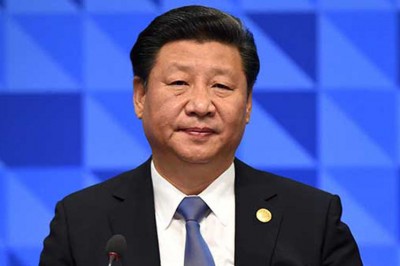The World Economy and China’s “Belt and Road” Project, President Xi Jingping at G20
Promoting Openness and Inclusiveness to Achieve Interconnected Growth. The State of the Global Economy by President Xi Jinping, at the G20 Hamburg Summit

HAMBURG, Germany, July 7 – Chinese President Xi Jinping on Friday delivered a speech at the 12th Summit of the Group of 20 (G20) major economies. The following is the full text of the speech:
Chancellor Merkel,
Dear colleagues,
It is a great pleasure to be with you in Hamburg, the City of Bridges, to discuss ways of building a bridge of cooperation to advance our shared prosperity. First of all, I express heartfelt appreciation to you, Chancellor Merkel, and the German government for your warm hospitality.
The global economy is showing signs of moving in the right direction. The related international organizations forecast that it will grow by 3.5 percent this year, the best performance that we have seen in several years. This would not be possible without the efforts of the G20. On the other hand, the global economy is still plagued by deep-seated problems and faces many uncertainties and destabilizing factors.
Facing such challenges, the G20 agreed in Hangzhou last year on the path forward: building an innovative, invigorated, interconnected and inclusive world economy. This year, building on the theme of the Hangzhou Summit, the Hamburg Summit has made “Shaping an Interconnected World” its theme. What we need to do now is to work together to translate our vision into action. With this in mind, I wish to state the following:
Firstly, we should stay committed to building an open global economy. This commitment of the G20 to build open economies saw us through the global financial crisis, and this commitment is vital to reenergizing the global economy. Various international organizations have revised upward forecast for this year’s global growth, mainly because of a projected 2.4 percent growth for global trade and 5 percent growth for global investment. We must remain committed to openness and mutual benefit for all so as to increase the size of the global economic “pie”. As the world’s major economies, we should and must lead the way, support the multilateral trading system, observe the jointly established rules and, through consultation, seek all-win solutions to common challenges we face.
Secondly, we should foster new sources of growth for the global economy. Innovation, more than anything else, is such a new source of growth. Research shows that 95 percent of the world’s businesses are now closely linked with the Internet, and the global economy is transitioning toward a digital economy. This means we should boost cooperation in digital economy and the new industrial revolution and jointly develop new technologies, new industries, new business models and new products. Another source of growth derives from making greater efforts to address the issue of development and implement the 2030 Agenda for Sustainable Development, and such efforts will both benefit developing countries and generate business and investment opportunities for developed countries. In other words, this will be a win-win game for all. At the Hangzhou Summit last year, we reached important consensus on innovation and development. This momentum of cooperation created has been sustained this year under the German chairmanship of G20. Going forward, we should see that more substantial and concrete outcomes are delivered.
Thirdly, we should work together to achieve more inclusive global growth. Currently, global economic growth is not balanced, and technological advances work against job creation. According to the projection of the World Economic Forum, artificial intelligence will take away more than 5 million jobs in the world by 2020. The G20 has an important mission, which is to reaffirm the vision of pursuing inclusive growth agreed upon at the Hangzhou Summit last year, and strike a balance between fairness and efficiency, between capital and labor, and between technology and employment. To achieve this goal, we must ensure synergy between economic and social policies, address the mismatch between industrial upgrading and knowledge and skills, and ensure more equitable income distribution. The G20 needs to place more importance on cooperation in education, training, employment, business start-up and wealth distribution-related mechanisms, as progress on these fronts will make economic globalization work better.
Fourthly, we should continue improving global economic governance. In the wake of the global financial crisis, the G20 has done a lot to improve macroeconomic policy coordination, reform international financial institutions, tighten international financial regulation and combat tax avoidance, thus ensuring financial market stability and recovery. We should build on these achievements. In particular, we should strengthen coordination of macroeconomic policies, forestall risks in financial markets and develop financial inclusion and green finance to make the financial sector truly drive the development of the real economy.
China recently hosted a successful Belt and Road Forum for International Cooperation. Acting in the spirit of extensive consultation, joint contribution and shared benefits, the forum participants achieved fruitful outcomes in terms of boosting the connectivity of policies, infrastructure, trade, finance and people. Guided by a new vision of governance, we built a new platform of cooperation to tap into new sources of growth. The commitment of the Belt and Road Forum is highly compatible with the goal of the G20.
A German saying goes to the effect that, “Those who work alone, add; those who work together, multiply.” In this spirit, let us work together to promote interconnected growth for shared prosperity and build toward a global community with a shared future.
Thank you.

